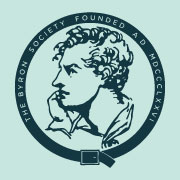By Peter Gallagher, part of our Why isn’t Don Juan Read More series.
20th May 2019
In the past few posts I’ve been asking why Don Juan is not more widely known and admired as “the greatest comic poem in english” (according to Germaine Greer). I’ve also been thinking about how to boost its modern renown.
I suggested last time that an audio performance could help overcome some of the challenges the language and the text pose for potential fans. It might be easier to draw listeners into Don Juan and perhaps encourage them to become readers.
Reading aloud, or listening to the poem, works well for Don Juan for two reasons.
First, it’s a personal statement. The narrative, when there is one, never much conceals the narrator and, where there’s any danger it might, Byron steps forward to direct our attention back to himself in an aside or with a clever rhetorical trope. Voice is the poem’s medium, rather than meditation.
Second, the tone is conversational. The verse is carefully structured (more on this next time). But Byron is so adept at his art that the regularity of the verse disappears into what sounds like direct speech with the pauses, elisions and switches of attention that we’re used to hearing in conversation. Byron’s pitch is polished, sometimes wordy, deceptively casual — here and there almost ‘patter’ — that can best be compared to ‘stand-up’, spoken comedy. It may best be appreciated when performed, ‘viva voce‘.
The days of comedy are gone, alas… (Canto XIII)
Still, many critics don’t seem to get it.
Byron’s overt performance in Don Juan has long been acknowledged: it prompted some of the strongest attacks, even before the poem’s first publication. Both friends and enemies said he was being contrary and amusing, but irresponsible; failing in his moral and social duty to uplift; wasting his gifts on vulgarity, blasphemy and flim-flam. Later critics said he was hiding behind the ever changing flow of ideas and insults; content to be suggestive and superficial; finding fault with others but ducking the hard questions about himself.
Then, the variety of Byron’s tone that strikes us as the essence of ironic commentary, puzzled many contemporary readers. For example, Francis Cohen, one of John Murray’s circle of readers, wrote to the publisher on the day after the poem went on sale to offer a criticism that many others also made (and that Byron famously mocked):
“The bursts and touches of poetry of a are exquisite, his wit is graceful, elastic, nervous & supple. – Like Shakespeare he shows that his soul can soar well into the seventh heaven, & that when he returns into this body he can be as merry as if sublimity ne’er was known. – But Lord B. should have been grave & gay by turns; grave in one page & gay in the next; grave in one stanza & gay in the next; grave in one line, & gay in the next. And not grave & gay in the same page, or in the same stanza, or in the same line… we are never drenched & scorched at the same instant whilst standing in one spot.” (Francis Cohen to John Murray, 16 July 1819)
His most influential critic, Matthew Arnold, demoted Byron to second place in the Romantic Poetry pantheon, behind Wordsworth. He detected, in Byron’s comic medley a refusal (inability?) to sustain serious reflection; a lack of self-knowledge and moral guidance. Here is Arnold in his preface to his one-volume selection of Byron quoting another Byron fan, Goethe, on Byron with approval:
On the one hand, a splendid and puissant personality — a personality “in eminence such as has never been yet, and is not likely to come again “; of which the like, therefore, is not to be found among the poets of our nation, by which Byron ” is different from all the rest, and in the main greater.” Byron is, moreover, “the greatest talent of our century.” On the other hand, this splendid personality and unmatched talent, this unique Byron, “is quite too much in the dark about himself”, nay, “the moment he begins to reflect; he is a child.” There we have, I think, Byron complete
In the past few decades a stream of criticism has even pathologised this comic “mobility” in Don Juan (there’s an overview of this debate here). Several influential critics cite Byron’s refusal to take himself or (he says) his poetry seriously as a convenient device to escape the close examination of his true feelings about, for example, the Freudian horrors they believe he hints at in Canto I: incest, oedipal feelings, Calvinistic guilt. Philip Martin in an influential 1982 examination of Byron’s public persona argued that his performance is a diversion from his “sense of personal hollowness” and “impedes the manifestation of a controlling self-awareness in the poetry”.
“You must not mind occasional rambling I mean it [Don Juan] for a poetical T[ristram] Shandy – or Montaigne’s Essays with a story for hinge.” Byron to Douglas Kinnaird, September 1822.
Sure, his harsher critics have a point… of sorts; at least about Don Juan. Byron’s self-regard is as constant as Montaigne’s, but it serves the purpose of comedy and self-publicity, rather than self-knowledge. If you’re looking for a “controlling self-awareness” you’ll likely find, like Philip Martin — or Arnold before him — that Byron won’t cooperate.
Still, is that really a problem? I think critics of Byron’s “mobility” may mistake today’s taste. Today’s readers, besieged by a vast range of media, are accustomed to a broad palette of tones. The discrimination we need to navigate ‘fake news’, Twitter provocations, targeted web advertisements and the “tabloid-isation” of everything makes us more open comedy that is perhaps insincere and even cynical (Is this reallya modern trait? I guess Swift’s admirers must have shared similar tastes.) It’s not always necessary to endorse a view or attach it to some sincere personality to take notice and even to enjoy. Retweets are not endorsements!
It’s not at all hard to enjoy a poem in which Byron spends most of the time trolling his audience. His satyrical targets are real issues such as the violence and violation of love (Juan with both Julia and Haidée), bravery and mere bravado (“The Isles of Greece”), accidental valour and the limits of humanity (the siege of Ismail), power as aphrodisiac (Juan and Catherine), the emptiness of fame, urban ugliness, the prostitution of politics…
He advocates, often sarcastically, a strong libertarian — although not democratic — humane view on most of these things and some funny, quirky views on others (technology, ‘avarice’), but not a system of personal philosophy. His poem’s a tease, a taunt, meant to discomfort as well as amuse. But, it’s fun. There’s an enormous range in Don Juan and more than a hint of psychology. But that’s also true of the humour of, say, Ricky Gervaise (Byron offers more delight, in my view). Both are clever satirists; neither will allow the agony to overtake the comedy.
Next…
I’d like to give you some examples of what I mean by Byron’s trolling for comic effect in Don Juan. But I’ve run out of space in this post. Next time: some examples, with audio, of Byron’s rather polished slip-sliding, dodging and ducking the issue…
Footnote:
Byron’s response in a letter to Murray: “Blessings on his experience! – Ask him these questions about “scorching and drenching.” – Did he never play at Cricket or walk a mile in hot weather? – Did he never spill a dish of tea over his testicles in handing the cup to his charmer to the great shame of his nankeen breeches? – Did he never swim in the sea at Noonday with the Sun in his eyes and on his head – which all the foam of Ocean could not cool? did he never draw his foot out of a tub of too hot water damning his eyes and his valet’s? did he never inject for a Gonorrhea? – or make water through an ulcerated Urethra? – Was he ever in a Turkish bath – that marble paradise of sherbet and sodomy? – was he ever in a cauldron of boiling oil like St John? – or in the sulphureous waves of hell? (where he ought to be for his “scorching and drenching at the same time”) did he never tumble into a river or lake fishing – and sit in his wet cloathes in the boat – or on the bank afterwards “scorched and drenched” like a true sportsman? – – – “Oh for breath to utter!” – – – but {make} him my compliments – he is a clever fellow for all that – a very clever fellow. – –”
For more entries in this Series, go to Why isn’t Don Juan Read More?
Peter Gallagher (@madbaddangerous) blogs at https://madbaddangerous.com. He plans to publish an annotated and narrated version of Cantos I and II of Don Juan later this year in celebration of the bi-Centenary of the first publication of greatest comic poem in English.

